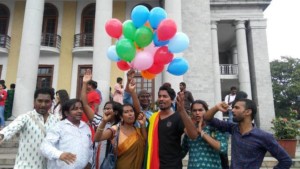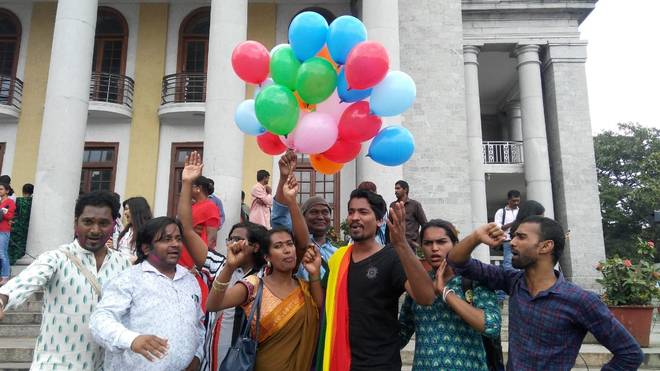 NEW DELHI: Gay sex among consenting adults is not a criminal offence, the Supreme Court has unanimously ruled, holding that part of a 158-year-old colonial law that criminalized it, violated the constitutional right to equality and dignity. The top court decriminalized part of the Section 377 of the Indian Penal Code that criminalizes consensual gay sex, saying it was irrational, indefensible and manifestly arbitrary.
NEW DELHI: Gay sex among consenting adults is not a criminal offence, the Supreme Court has unanimously ruled, holding that part of a 158-year-old colonial law that criminalized it, violated the constitutional right to equality and dignity. The top court decriminalized part of the Section 377 of the Indian Penal Code that criminalizes consensual gay sex, saying it was irrational, indefensible and manifestly arbitrary.
A five-judge constitution bench headed by Chief Justice Dipak Misra unanimously held that the Lesbian, Gay, Bisexual, Transgender and Queer (LGBTQ) community possess the same constitutional rights as other citizens of the country. It termed sexual orientation as a “biological phenomenon” and “natural” and held that any discrimination on this ground was violative of the fundamental rights.
“It is declared that insofar as Section 377 criminalizes consensual sexual acts of adults in private, is violative of Articles 14, 15, 19, and 21 of the Constitution. It is, however, clarified that such consent must be free consent, which is completely voluntary in nature, and devoid of any duress or coercion,” the bench ruled. Delivering a 493-page judgment, the court said “morality cannot be martyred at the altar of social morality and only constitutional morality can allowed under the rule of law”, while also holding that section 377 was used as a weapon to harass the members of the LGBTQ community, resulting in discrimination,
Justice Indu Malhotra, a member of the bench in her separate judgment, said that history owed an apology to the members of this community and their families, for the delay in providing redressal for the ignominy and ostracism that they have suffered through the centuries. Justice D Y Chandrachud also said that due to Section 377, the LGBTQ members were forced to live in hiding and as second class citizens, while the others used to enjoy the right of sexual orientation.
“Section 377 IPC, so far as it penalizes any consensual sexual relationship between two adults, be it homosexuals (man and a man), heterosexuals (man and a woman) or lesbians (woman and a woman), and cannot be regarded as constitutional. However, if anyone, by which we mean both a man and a woman, engages in any kind of sexual activity with an animal, the said aspect of Section 377 is constitutional and it shall remain a penal offence under Section 377 IPC.
“Any act of the description covered under Section 377 IPC done between two individuals without the consent of any one of them would invite penal liability under Section 377 IPC,” the apex court said in its landmark verdict. The bench, which also comprised Justices R F Nariman and A M Khanwilkar, besides the CJI, Malhotra and Chandrachud, said that part of Section 377, which prohibited sexual relationship between consenting adults of the same sex, was violative of the right to equality and the right to live with dignity.
It said the State cannot persecute people and decide the boundaries between what is permissible or not and observed that section 377 was based on “deep-rooted stereotypes of the society”. In four separate but concurring judgments, the top court set aside its 2013 verdict in the Suresh Kaushal case which had re-criminalized “consensual unnatural sex”.
The bench said the other aspects of Section 377 of the IPC dealing with unnatural sex with animals and children would remain in force. “The declaration of the aforesaid reading down of Section 377 shall not, however, lead to the reopening of any concluded prosecutions, but can certainly be relied upon in all pending matters whether they are at the trial, appellate, or revisional stages,” Justice Malhotra said, adding that the provisions of Section 377 will continue to govern non-consensual sexual acts against adults and all acts of carnal intercourse against minors besides acts of bestiality.
Section 377 refers to ‘unnatural offences’ and says whoever voluntarily has “carnal intercourse against the order of nature” with any man, woman or animal shall be punished with imprisonment for life, or with imprisonment of either description for a term which may extend to 10 years, and shall also be liable to pay a fine. The historic judgment came on a batch of writ petitions filed by dancer Navtej Jauhar, journalist Sunil Mehra, chef Ritu Dalmia, hoteliers Aman Nath and Keshav Suri, business executive Ayesha Kapur and 20 former and current students of the IITs.
The bench said the courts must protect the dignity of an individual as right to live with dignity is recognized as a fundamental right. “Sexual orientation is one of the many biological phenomena which is natural and inherent in an individual and is controlled by neurological and biological factors. The science of sexuality has theorized that an individual exerts little or no control over who he/she gets attracted to. Any discrimination on the basis of one s sexual orientation would entail a violation of the fundamental right of freedom of expression,” it said.
Justice Chandrachud, while reading out the operative portion of his verdict, said members of LGBTQ community were targeted and exploited due to Section 377. Observing that the Constitution nurtured dissent as a “safety valve” of the society, he said “we cannot change the history but can pave a way for better future.” The bench also said that homosexuality was not a mental disorder but a completely natural condition. PTI







